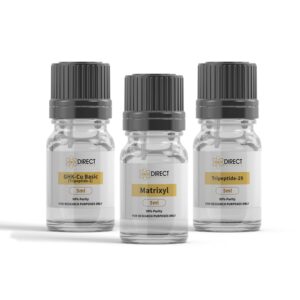Buy Topical Peptides
Buy Topical peptides for research. These short chains of amino acids applied to the skin have potential in promoting collagen production, wound healing, and delivering anti-ageing benefits.
Shop our Full Range of Topical Peptides
-
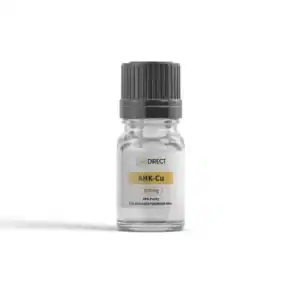
AHK-Cu (Topical)
£109.08 -
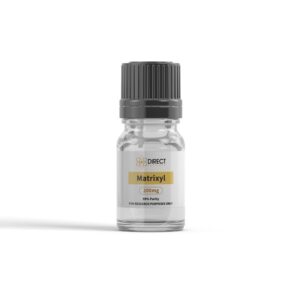
Matrixyl Topical Peptide
£100.10 -
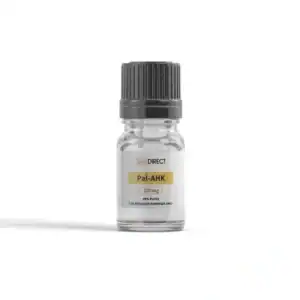
PAL-AHK (Topical)
£109.08 -
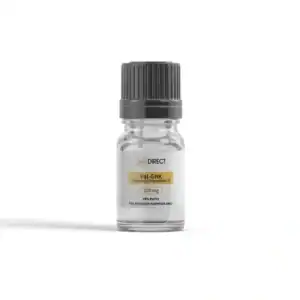
PAL-GHK (Topical)
£97.85 -
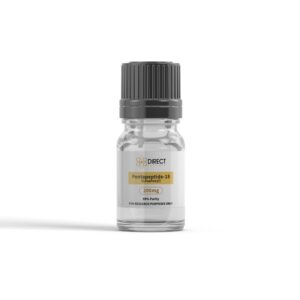
SALE
Pentapeptide-18 (Topical)
£97.85Original price was: £97.85.£88.06Current price is: £88.06. -
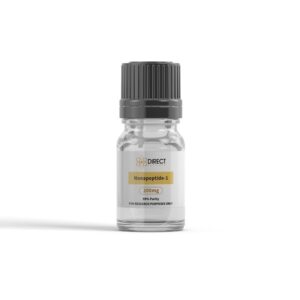
SALE
Nonapeptide-1 (Topical)
£109.08Original price was: £109.08.£98.17Current price is: £98.17. -
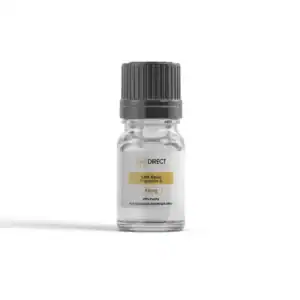
GHK Basic (Topical)
£24.70 -
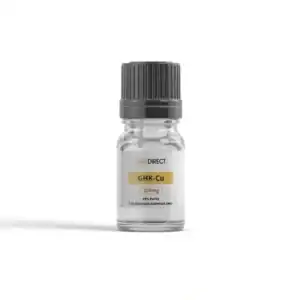
GHK-Cu (Topical)
£101.06 -
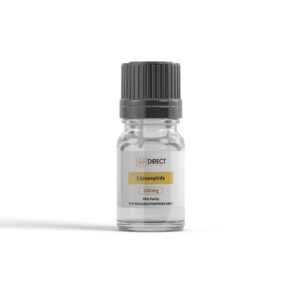
Lipopeptide Topical Peptide
£130.26 -
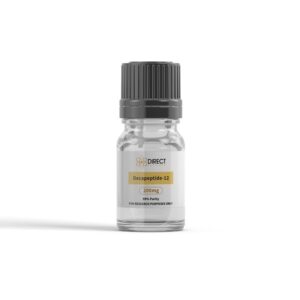
SALE
Decapeptide-12 (Topical)
£176.46Original price was: £176.46.£158.81Current price is: £158.81. -
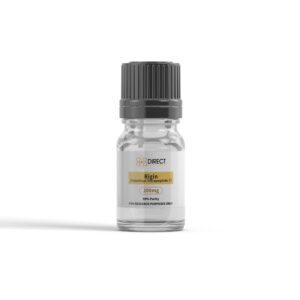
SALE
Rigin (Topical)
£97.85Original price was: £97.85.£88.06Current price is: £88.06. -
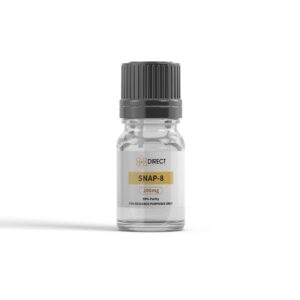
SNAP-8 (Topical)
£97.85 -
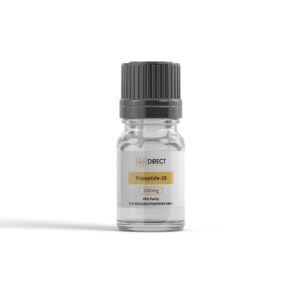
Tripeptide-29 (Topical)
£130.26 -
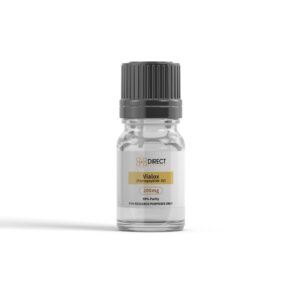
SALE
Vialox (Topical)
£97.85Original price was: £97.85.£88.06Current price is: £88.06. -
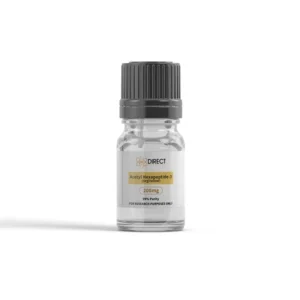
Acetyl Hexapeptide-3 (Topical)
£97.85
What are Topical Peptides?
Topical peptides are short chains of amino acids specifically formulated to be applied to the skin. These potent compounds are integral in various dermatological treatments. This is due to their ability to penetrate the skin and interact at a cellular level. They work by signalling skin cells to perform specific functions such as:
– collagen production
– wound healing
– and hydration.
As a result, topical peptides are frequently incorporated into skincare products. They are aimed at reducing wrinkles, improving skin elasticity, and promoting a more youthful complexion. The efficacy of these peptides depends on their composition, stability, and the delivery system used to ensure their absorption and activity within the target skin layers.
Mechanism of Action of Topical Peptides
The mechanisms through which topical peptides exert their effects are rooted in their capacity to mimic naturally occurring signalling molecules within the skin. These peptides interact with specific receptors on the surface of skin cells, activating pathways that regulate various biological processes.
For instance, signal peptides are designed to stimulate fibroblasts to produce collagen, a critical protein that provides structural integrity and elasticity to the skin. Carrier peptides, on the other hand, enhance the delivery of essential trace elements such as copper and manganese, which are vital for enzymatic processes that facilitate wound healing and tissue repair.
The precise delivery and stability of these peptides are crucial, as they must remain intact and functional upon reaching the epidermis and dermis. Advanced delivery systems, including encapsulation in liposomes or conjugation with lipid-based carriers, are often employed to enhance penetration and protect peptides from enzymatic degradation, thereby amplifying their therapeutic efficacy.
What Are The Potential Research Benefits of Topical Peptides?
Anti-Ageing Properties: As the demand for anti-ageing solutions grows, researchers are focusing on the development of peptides that can more effectively stimulate collagen and elastin production, reduce wrinkles, and improve skin texture. Studies are also investigating the long-term benefits and cumulative effects of sustained peptide use.
Wound Healing and Tissue Repair: Research is delving into the potential of peptides to accelerate wound healing and tissue regeneration. This includes exploring peptides that can activate specific cellular pathways to enhance the skin’s natural repair processes, reduce scarring, and improve recovery times.
Anti-Inflammatory Effects: Understanding how peptides can mitigate inflammatory responses in the skin is a significant area of research. This includes identifying peptides that can reduce redness, swelling, and irritation, thereby improving the overall health of the skin and alleviating conditions such as acne and rosacea.
Skin Barrier Function: Strengthening and repairing the skin barrier is critical for maintaining healthy skin. Research is focused on peptides that can enhance the skin’s natural barrier function, increase hydration levels, and protect against environmental stressors such as pollutants and UV radiation.
Enhanced Delivery Systems: Developing advanced delivery systems to improve the penetration and stability of peptides in skincare formulations is another crucial area of research. This includes the use of nanotechnology, encapsulation methods, and other innovative techniques to ensure that peptides reach their targeted areas within the skin more efficiently.
Personalised Skincare: The potential for personalised skincare regimens incorporating tailored peptide solutions based on an individual’s unique skin profile is being explored. This research aims to develop customisable peptide-based treatments that address specific skin concerns and genetic predispositions.
Combination Therapies: Investigating the synergistic effects of combining peptides with other active ingredients, such as vitamins, antioxidants, and growth factors, is an area of growing interest. The goal is to create multi-functional skincare products that deliver enhanced benefits by leveraging the complementary actions of various components.
Signal Peptides
Several signal peptides have been identified and utilised in dermatological applications due to their ability to boost collagen production and improve skin health.
Notable examples include Matrixyl (Palmitoyl Pentapeptide-4), which stimulates the synthesis of collagen and glycosaminoglycans, promoting skin firmness and elasticity.
Another well-regarded signal peptide is Argireline (Acetyl Hexapeptide-3), which mimics the action of botulinum toxin by inhibiting neurotransmitter release, thereby reducing the appearance of expression lines and wrinkles.
Additionally, Palmitoyl Tripeptide-1 is known for its anti-inflammatory properties and role in the stimulation of collagen production, aiding in the repair of damaged skin. These peptides are often incorporated into advanced skincare formulations to enhance their rejuvenating and anti-ageing effects.
Carrier Peptides
Carrier peptides play a pivotal role in dermatological treatments by facilitating the transport of key ions and molecules into the skin, enhancing cellular processes vital for skin health.
One of the most notable carrier peptides is Copper Peptide (GHK-Cu), which has been extensively studied for its wound healing and anti-inflammatory properties. Copper peptides aid in the delivery of copper ions, which are crucial for angiogenesis, the production of antioxidant enzymes, and the stabilization of skin proteins.
These peptides are often formulated within advanced skincare products to deliver essential nutrients and promote skin repair and rejuvenation.
Frequently Asked Questions (FAQs) about Topical Peptides
What are topical peptides?
Topical peptides are short chains of amino acids applied directly to the skin. They are commonly used in skincare products for their ability to support collagen production, improve skin firmness, and reduce signs of ageing.
How do topical peptides work?
Peptides function as messengers in the skin, signalling cells to produce collagen and repair damaged tissue. Their small molecular structure allows them to penetrate the skin effectively and target specific concerns.
Are topical peptides safe for all skin types?
Yes, topical peptides are generally considered safe for most skin types, including sensitive skin. However, it’s always a good idea to perform a patch test before introducing a new product into your skincare routine.
When can peptide-based products be used?
Peptide products can be incorporated into both morning and evening skincare routines. For best results, follow the product instructions and layer peptides after cleansing and before moisturising.
Can peptides replace retinol or other active ingredients?
No, peptides are not a direct replacement for retinol or other actives like vitamin C or hyaluronic acid. They can, however, complement these ingredients to create a well-rounded skincare regimen.
How long does it take to see results from peptides?
Results will vary depending on the individual and the product, but most people notice improvements in skin texture and elasticity within 4-8 weeks of consistent use.
What should you not mix with peptides?
Peptides are generally well-tolerated and versatile, but there are a few ingredients to be cautious about when combining them.
Avoid using peptides with highly acidic ingredients like alpha hydroxy acids (AHAs) or beta hydroxy acids (BHAs) in the same routine, as these may break down the peptide structure, reducing their effectiveness.
Similarly, pairing peptides with strong exfoliants or high percentages of active ingredients may lead to irritation or counteract their benefits.
Buy Topical Peptides Malta from Direct Peptides.
Summary of Research Applications
- Anti-aging benefits
- Can help even skin tone
- Potential to reduce the appearance of fine lines
- Potential to enhance moisture and create a healthy skin barrier
- Can be added to lotion with essential oils
- Enhances spf protection
- Provide anti-inflammatory effects
- Promotes wound healing and skin repair
Topical Peptides Quality Assured
Our commitment to purity enhances our product’s quality and research potential, providing clients with reliable resources for innovative studies.
When you buy topical peptides from us, you can trust you’re getting a high-quality compound that supports your research efforts and provides valuable insights into skin health and ageing.
Plus, with our exceptional customer service and fast shipping, you can focus on your research while we take care of the logistics.
References For Further Reading
[1] F Gorouhi and H I Maibach (2009) Role of topical peptides in preventing or treating aged skin -International Journal of Cosmetic Science, 2009 Oct, Volume 31 (Issue 5), Pages 327-45.
[2] Varadraj Vasant Pai, Prasana Bhandari, and Pankaj Shukla (2017) Topical peptides as cosmeceuticals – Indian Journal of Dermatology Venereology and Leprology, 2017 Jan-Feb, Volume 83 (Issue 1), Pages 9-18.
[3] Peter M Elias (2010) Skin Barrier Function – Current Allergy and Asthma Reports, 2008 Jul, Volume 8 (Issue 4), Pages 299–305.
[4] Seng Han Lim, Yuanyuan Sun, Thulasi Thiruvallur Madanagopal, et al (2018) Enhanced Skin Permeation of Anti-wrinkle Peptides via Molecular Modification – Science Reports, 2018 Jan 25, Volume 8, Page 1596.
Why Choose Direct Peptides Malta?
Buy topical peptides Malta from Direct Peptides. We are a trusted supplier of high-quality research peptides. Our products are rigorously tested with guaranteed purity and bioactivity. With a diverse selection and dependable customer support, we are committed to meeting your research needs. Enjoy secure, reliable, and timely delivery tailored for dermatology and skincare studies.
ALL CONTENT AND PRODUCT INFORMATION AVAILABLE ON THIS WEBSITE IS FOR EDUCATIONAL PURPOSES ONLY.
DISCLAIMER: These products are intended solely as a research chemical only. This classification allows for their use only for research development and laboratory studies. The information available on our Malta Direct Peptides website: https://direct-peptides.com is provided for educational purposes only. These products are not for human or animal use or consumption in any manner. Handling of these products should be limited to suitably qualified professionals. They are not to be classified as a drug, food, cosmetic, or medicinal product and must not be mislabelled or used as such.
Related Posts

What Are Topical Peptides In Skincare?
The blog explores the transformative effects of topical peptides in skincare and anti-aging, emphasizing their ability to reduce wrinkles and boost collagen production for youthful skin. It covers emerging trends, like the combination of peptides with nanotechnology and personalized formulations, while also highlighting their potential in regenerative medicine for wound healing and scar reduction.

A Guide To Anti-Aging Peptides For Healthy Skin
This blog covers the benefits of peptides like GHK-Cu for anti-aging, Snap 8 for wrinkle reduction, and Melanotan 2 for tanning and appetite suppression. It highlights their potential to promote skin health, youthfulness, and overall well-being, offering insights for research professionals.

Discover The Best Anti-Aging Peptides On The Market
This blog explores anti-aging peptides, focusing on MOTS-c and its potential for aging and metabolic health research. It highlights SNAP 8 topical peptide benefits for research purposes.

